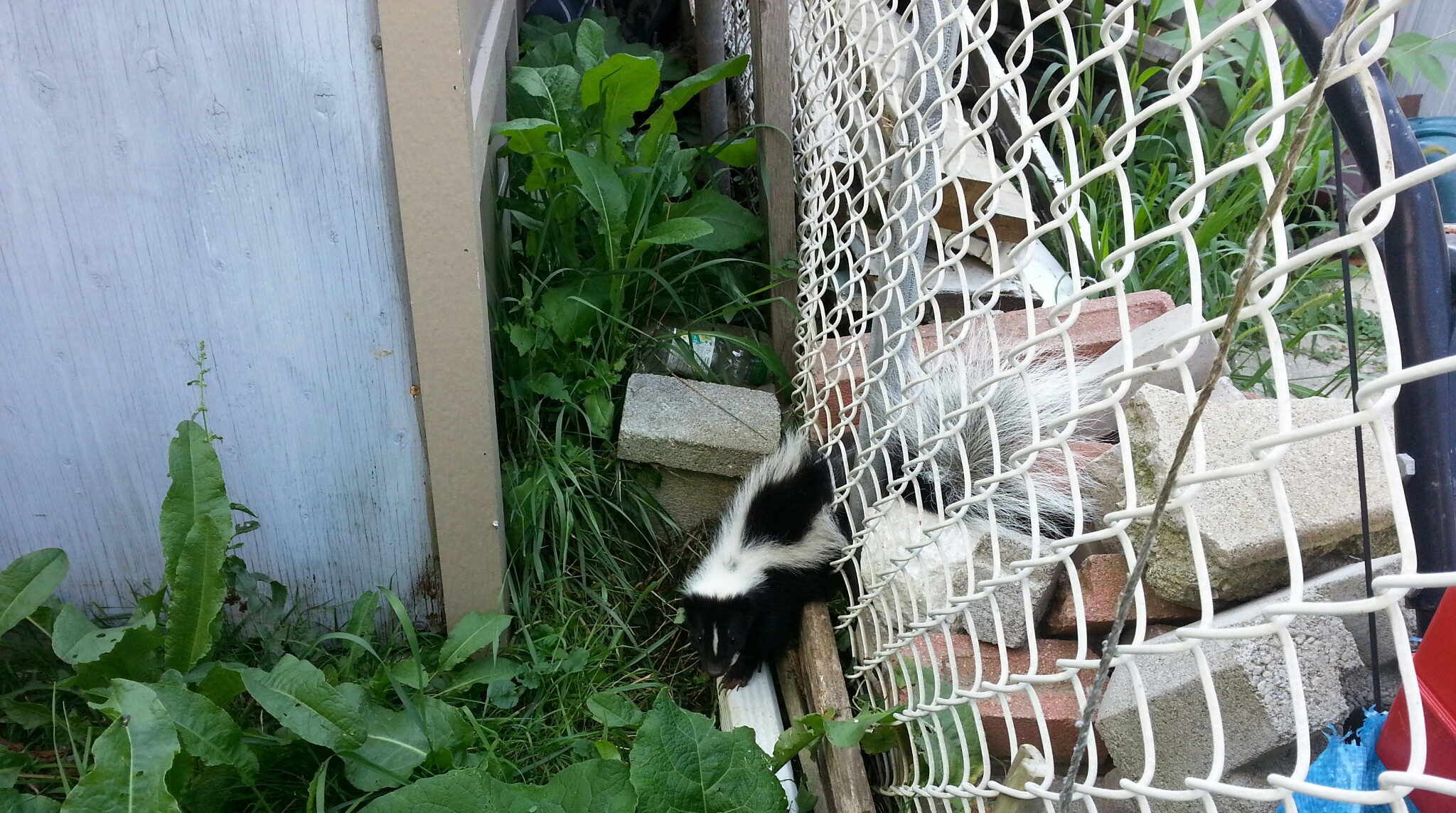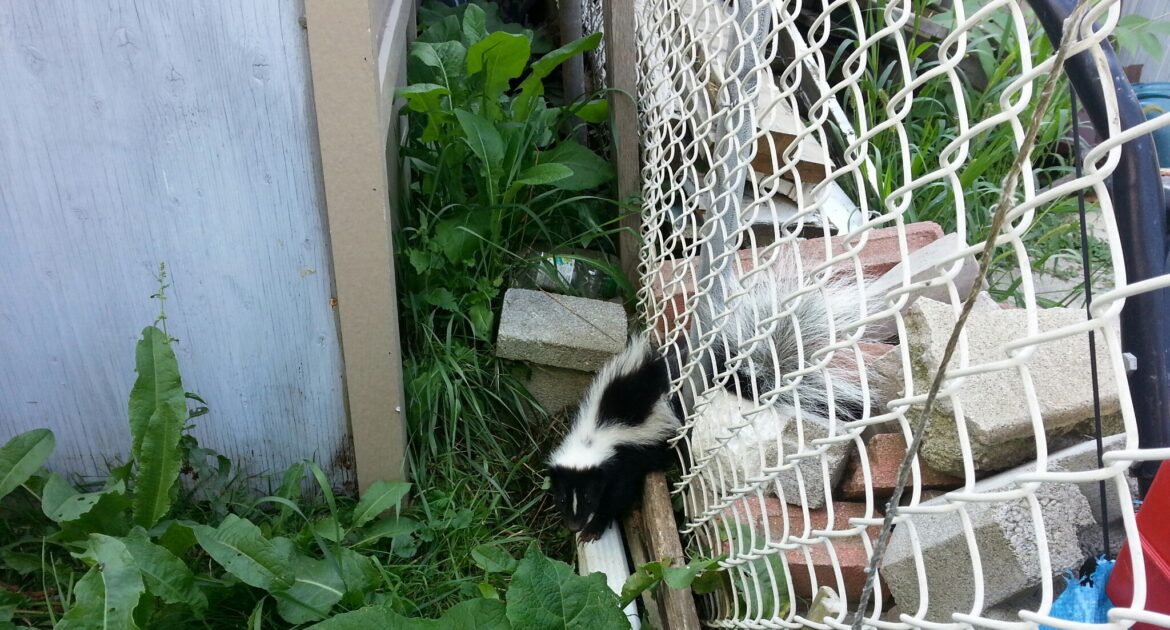If you’ve recently noticed signs of skunks in your outdoor space, you’re not alone. Skunks are commonly spotted in Toronto neighbourhoods, from near Kensington Market to Casa Loma. They’re attracted to gardens for food, shelter, and safety, but their presence can raise concerns for homeowners. You might be wondering about effective solutions for skunks in the garden, whether you should worry about skunks on your property, and what methods exist for humane garden pest control for skunks. The bottom line is you shouldn’t be too worried about skunks in your garden if they are appropriately handled.
Below, we’ll explore how to identify skunk activity, understand the potential risks of having them in your space, and share practical steps you can take to reduce encounters with these animals.
Skunks in Your Garden: Solutions
When it comes to managing skunks in your outdoor space, the first step is identifying why they’re there. Skunks are opportunistic creatures, often visiting backyards and gardens in search of food or shelter. Here’s how you can discourage them:
Remove Attractants
- Secure Trash Cans: Skunks are notorious scavengers. Ensure garbage cans have tight-fitting lids to prevent access to food scraps.
- Eliminate Pet Food: Avoid leaving pet food outdoors, as this is an easy food source.
- Tidy Your Compost: If you compost, ensure it’s enclosed to keep the tempting food smells under wraps.
- Reduce Natural Food Sources:
- Skunks forage for insects like grubs in lawns. If your yard shows signs of digging, treat the lawn for grubs.
- Remove fallen fruits or vegetables from your garden promptly.
Install Barriers and Repellents
- Install fencing around your garden. Skunks aren’t climbers, but they are excellent diggers. Bury fencing 6-8 inches into the ground to prevent them from burrowing underneath.
- Motion-activated lights or sprinklers can startle skunks without causing harm.
- Citrus peelings or ammonia-soaked rags placed strategically around your property can deter visits.
- Predator urine, like that of a dog or coyote, can discourage skunks from establishing a den nearby.
Maintain Your Property
Keep woodpiles, shed bases, and decks sealed and tidy. These areas are common spots for skunks to burrow and create dens.
With these skunks in garden solutions, you can minimize their activity and reclaim control of your outdoor space.
Should You Worry About Skunks?
Skunks are not inherently dangerous animals, and they play a beneficial role in the environment by controlling insect populations. However, their presence near your home carries some risks, especially when they settle in gardens or under structures.
Here are the main concerns to consider:
Disease Risks:
Skunks are carriers of several diseases, including rabies. While rabies is rare, the disease can spread through bites or scratches from infected animals. It’s also important to avoid any direct contact with skunks, especially if they appear sick or are unusually active during the day.
Damage to Property:
Skunks can cause physical harm to your property:
- Structural Damage:
They often burrow under porches, sheds, or decks, which can weaken the foundation of these structures over time.
- Lawn Destruction:
If you spot small holes or patches in your lawn, it’s likely that they’ve been digging for grubs or insects.
Odour:
The most notorious issue with skunks is their spray. If they feel cornered or threatened, they release a pungent odour as a defence mechanism. This smell doesn’t just linger in the air but can seep into fabric, walls, and even soil if sprayed within close proximity to your home.
Taking proactive measures helps ensure the safety of your family, pets, and property while reducing the stress of coexisting with skunks.
Garden Pest Control for Skunks
Once you’ve identified unwanted skunk activity, garden pest control for skunks doesn’t have to be overwhelming. Here are three simple, humane steps to create a skunk-free environment:
- Identify Skunk Entry Points
Inspect your yard for signs of skunk activity:
-
- Are there burrow entrances near decks or sheds?
- Do you notice paths through the grass leading to potential dens?
Mark these areas for targeted prevention measures.
- Humanely Encourage Skunks to Move On
If you’ve located an active den, avoid DIY removal methods that could inadvertently stress or harm the animal. Instead:
-
- Gently encourage movement by introducing bright lights or making noise near the den to create an undesirable environment.
- Prevent Future Intrusions
Take these steps to make your space less inviting:
-
- Install a heavy-duty fence or barrier to block off access to common den sites.
- Work with professionals to seal potential entry points. The Skedaddle team uses eco-friendly measures like installing underground mesh barriers that don’t disrupt garden aesthetics.
Why Toronto Homeowners Should Act Quickly
Skunks are nocturnal creatures, which means spotting them during daylight hours isn’t common unless they have babies to feed or are looking for food. Spring and early summer are peak times for skunks to give birth and establish a home base. Leaving skunks unchecked during these months can result in multiple family members taking permanent residence on your property.
Toronto’s neighbourhoods, from Buckhead to Decatur, tend to offer the ideal combination of food sources and shelter for skunks. Whether it’s ripe fruit trees in backyard gardens or garden sheds nestled along wooded areas, your property could become an appealing spot if precautions aren’t taken.
The Best Time to Contact Skedaddle for Skunk Removal Services
Timing is everything when it comes to effective skunk removal and wildlife control. The sooner you identify a potential skunk issue and contact Skedaddle, the easier it is to prevent property damage and unpleasant encounters. Skunks are most active during their breeding season, which typically occurs in late winter to early spring. During this time, skunks often seek out sheltered spaces like under decks, porches, or sheds to create dens and raise their young. If you notice telltale signs such as a strong, musky odour or evidence of digging around your property, it’s a clear signal to act quickly.
Even outside of breeding season, it’s wise to reach out to us if you suspect skunk activity. Regular inspections and proactive maintenance can help identify areas of your property that might attract skunks in the future. With Skedaddle’s experienced, dependable, and customer-focused team, you can trust that your skunk problem will be handled efficiently, no matter the time of year.
What to Do Next
If your efforts to deter skunks don’t resolve the problem, or if you suspect a den near your home, it’s important to call professionals. At Skedaddle, we specialize in humane, eco-friendly solutions to prevent unwanted wildlife from inconveniencing your daily life.
Our team has decades of experience working with families across Toronto, and we’re ready to lend our expertise to keep your property secure.
Don’t wait for the problem to escalate. Contact us today to ensure that your garden stays clean, safe, and skunk-free!




